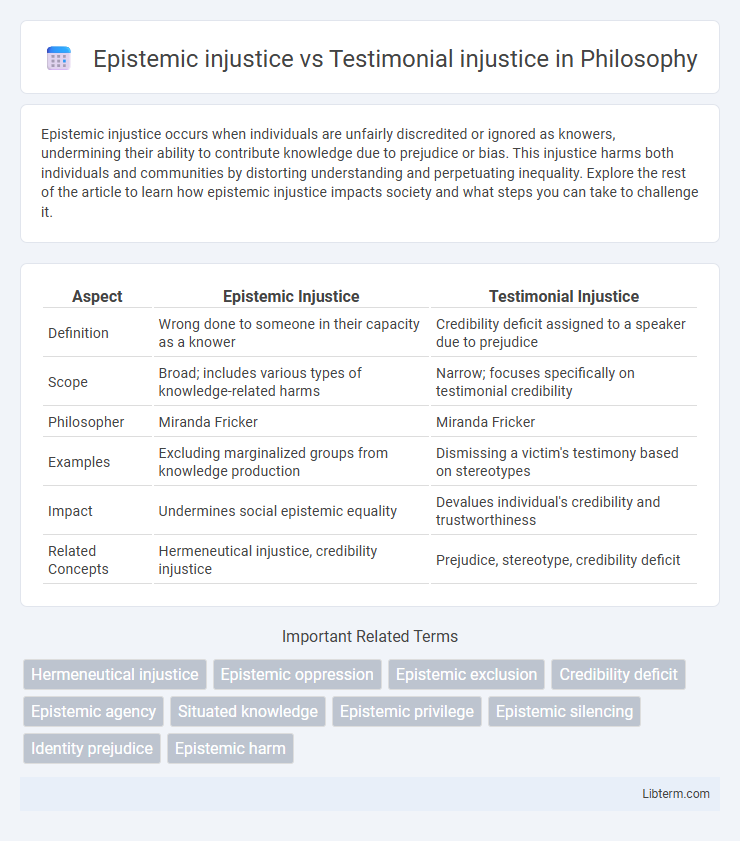Epistemic injustice occurs when individuals are unfairly discredited or ignored as knowers, undermining their ability to contribute knowledge due to prejudice or bias. This injustice harms both individuals and communities by distorting understanding and perpetuating inequality. Explore the rest of the article to learn how epistemic injustice impacts society and what steps you can take to challenge it.
Table of Comparison
| Aspect | Epistemic Injustice | Testimonial Injustice |
|---|---|---|
| Definition | Wrong done to someone in their capacity as a knower | Credibility deficit assigned to a speaker due to prejudice |
| Scope | Broad; includes various types of knowledge-related harms | Narrow; focuses specifically on testimonial credibility |
| Philosopher | Miranda Fricker | Miranda Fricker |
| Examples | Excluding marginalized groups from knowledge production | Dismissing a victim's testimony based on stereotypes |
| Impact | Undermines social epistemic equality | Devalues individual's credibility and trustworthiness |
| Related Concepts | Hermeneutical injustice, credibility injustice | Prejudice, stereotype, credibility deficit |
Defining Epistemic Injustice
Epistemic injustice refers to the systematic wrong done to someone in their capacity as a knower, undermining their ability to contribute knowledge or participate in epistemic practices. It encompasses various forms of unfairness, including testimonial injustice, where a speaker's credibility is unjustly deflated due to prejudice. Defining epistemic injustice involves recognizing these specific harms that affect the distribution of knowledge and the recognition of individuals as reliable sources.
Understanding Testimonial Injustice
Testimonial injustice occurs when a speaker's credibility is unfairly deflated due to prejudice, leading to a wrongful discounting of their knowledge or testimony. It is a specific form of epistemic injustice that impairs the transmission of knowledge by undermining the trustworthiness attributed to certain individuals or groups. Understanding testimonial injustice involves recognizing how social biases distort epistemic practices and hinder epistemic agents from contributing equally to knowledge-sharing processes.
Theoretical Foundations of Epistemic Injustice
Epistemic injustice, a concept developed by Miranda Fricker, encompasses various forms of unfair treatment related to knowledge and belief, among which testimonial injustice is a primary subtype where a speaker's credibility is unjustly deflated due to prejudice. Theoretical foundations of epistemic injustice draw on epistemology and social justice, highlighting how power dynamics and identity influence the distribution of epistemic goods such as knowledge, understanding, and credibility. This framework critiques traditional epistemology by emphasizing the moral dimension of knowledge practices and the impact of systemic biases on marginalized groups' participation in epistemic communities.
Types of Epistemic Injustice: Testimonial and Hermeneutical
Epistemic injustice occurs when individuals are wronged specifically in their capacity as knowers, with testimonial injustice arising when a speaker's credibility is unjustly deflated due to prejudice, leading to disregarded testimony. Hermeneutical injustice happens when there is a gap in collective interpretive resources, causing marginalized groups to be unable to make sense of or communicate their social experiences effectively. Both types highlight systemic epistemic harm, with testimonial injustice focusing on the credibility deficit and hermeneutical injustice on the structural interpretive marginalization.
Testimonial Injustice: Key Concepts and Examples
Testimonial injustice occurs when a speaker's credibility is unfairly deflated due to prejudice, leading to their knowledge being undervalued or dismissed. This form of epistemic injustice disproportionately affects marginalized groups, such as racial minorities or women, when their testimonies are systematically doubted or ignored in legal, educational, or social contexts. Key examples include a court disregarding a witness's account because of racial bias, or workplace scenarios where employees' reports are dismissed due to gender stereotypes.
Distinguishing Epistemic and Testimonial Injustice
Epistemic injustice encompasses a broader range of wrongs where individuals are unfairly treated in their capacity as knowers, while testimonial injustice specifically involves the devaluation of a speaker's credibility due to prejudice. The concept of epistemic injustice, introduced by Miranda Fricker, includes testimonial injustice and hermeneutical injustice, highlighting distinct but related forms of knowledge-based harm. Distinguishing these terms clarifies that testimonial injustice is a subtype of epistemic injustice, focusing on credibility deficits during testimony rather than general knowledge production or interpretation.
Causes and Consequences of Testimonial Injustice
Testimonial injustice occurs when a speaker's credibility is unfairly deflated due to prejudice, often rooted in social biases related to race, gender, or class. This form of epistemic injustice leads to the erosion of trust and the silencing of marginalized voices, ultimately obstructing the flow of knowledge and perpetuating systemic inequality. Consequences include the misallocation of epistemic authority and the reinforcement of social hierarchies, which undermine both individual dignity and collective understanding.
Addressing and Preventing Epistemic Injustice
Addressing and preventing epistemic injustice requires recognizing the inherent biases that undermine individuals' credibility, especially in marginalized communities. Implementing equitable testimonial practices involves training professionals to critically assess their own prejudices and actively validate diverse knowledge sources. Institutional reforms that promote inclusive dialogue and emphasize the value of experiential knowledge are crucial for mitigating both testimonial and broader epistemic injustices.
Case Studies: Epistemic vs Testimonial Injustice
Case studies on epistemic injustice reveal systemic issues where individuals or groups are wrongfully undermined in their capacity as knowers, encompassing both testimonial and hermeneutical injustices. Testimonial injustice specifically occurs when a speaker's credibility is unjustly deflated due to prejudice, as documented in cases involving marginalized witnesses in legal trials or patient testimonies in healthcare settings. Analysis of these cases highlights the nuanced distinctions between the broader framework of epistemic injustice and the focused dynamics of testimonial injustice, emphasizing the need for epistemic justice reforms in institutional practices.
Towards Epistemic Justice: Solutions and Future Directions
Epistemic injustice, encompassing both testimonial injustice and hermeneutical injustice, involves the unfair distribution of credibility and understanding in knowledge exchange. Testimonial injustice specifically arises when a speaker's credibility is unjustly deflated due to prejudice, limiting their ability to contribute valid knowledge. Addressing epistemic justice requires implementing inclusive epistemic practices, promoting diverse perspectives, and developing institutional reforms to ensure equitable recognition and validation of marginalized voices in knowledge production.
Epistemic injustice Infographic

 libterm.com
libterm.com